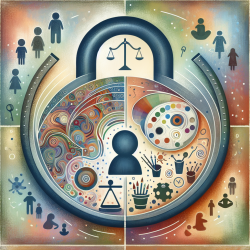Understanding the Impact of Childhood Justice Exposure on Mental Health
As practitioners in the field of speech-language pathology and therapy, it is crucial to base our interventions on solid research and data. The study titled "Association of Childhood History of Parental Incarceration and Juvenile Justice Involvement With Mental Health in Early Adulthood" sheds light on the significant impact that childhood exposure to the justice system can have on mental health outcomes in adulthood.
Key Findings from the Research
The study utilized data from the US National Longitudinal Survey of Adolescent to Adult Health to explore the associations between parental incarceration (PI), juvenile justice involvement (JJI), and mental health outcomes in early adulthood. The research found that young adults with a history of both PI and JJI reported more mental health conditions compared to peers with no justice system exposure during childhood. Specifically, the study highlighted increased risks of depression, anxiety, and posttraumatic stress disorder (PTSD) among those with dual exposure.
Implications for Practitioners
For practitioners, these findings underscore the importance of considering a child's background and history of justice system exposure when designing therapeutic interventions. Here are some actionable steps practitioners can take:
- Holistic Assessment: Incorporate questions about parental incarceration and juvenile justice involvement into initial assessments to better understand the child's background.
- Tailored Interventions: Design interventions that address the specific mental health challenges associated with justice system exposure, such as anxiety and PTSD.
- Collaboration: Work closely with other professionals, including mental health counselors and social workers, to provide comprehensive support to affected children.
- Advocacy: Advocate for policies that reduce the impact of the justice system on children and promote mental health support for those affected.
Encouraging Further Research
While the study provides valuable insights, it also highlights areas where further research is needed. Practitioners are encouraged to engage in or support research efforts that explore the long-term effects of justice system exposure on various aspects of mental health and development. By contributing to the growing body of knowledge, practitioners can help refine therapeutic approaches and improve outcomes for children.
Conclusion
Understanding the impact of childhood exposure to the justice system is essential for developing effective therapeutic interventions. By leveraging research findings and adopting a data-driven approach, practitioners can make informed decisions that enhance the mental health and well-being of children. To read the original research paper, please follow this link: Association of Childhood History of Parental Incarceration and Juvenile Justice Involvement With Mental Health in Early Adulthood.










